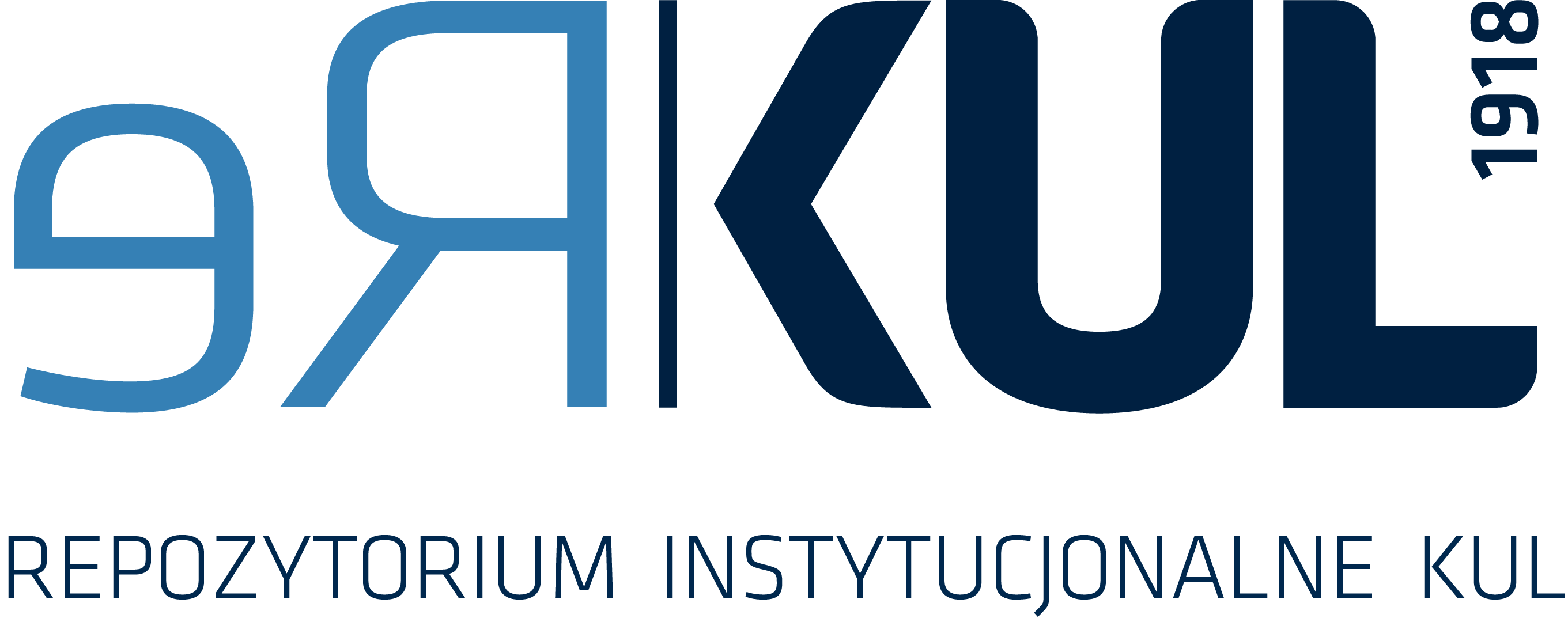The Repository collects scientific achievements of employees and doctoral students of the John Paul II Catholic University of Lublin. The purpose of the repository is dissemination of the scientific achievements of the John Paul II Catholic University of Lublin, promoting conducted scientific research and supporting didactic activities. The repository collects, stores and shares digital documents in the form of books, scientific articles, scientific journals, conference materials, didactic materials etc.
Communities in ReKUL
Recent Submissions
listelement.badge.dso-type Item , The Rhymed Office of Blessed Czesław(Towarzystwo Naukowe KUL, Katolicki Uniwersytet Lubelski Jana Pawła II, 2024-08-23) Smolarek, DariuszThe liturgy of the Roman Catholic Church in Europe and Poland was enriched by the cult of saints and blesseds who are commemorated during the church year. These events were associated with new liturgical texts and songs. They were included in the forms of the Holy Mass and the Liturgy of the Hours. This practice can be observed on the example of Polish saints: Stanisław the Bishop and Martyr, Wojciech (Adalbert), Jadwiga of Silesia. Along with their cult and canonization, mass prayers and breviary offices (often so-called "rhymed") were created. The same was true of the little-known, now blessed, first Polish Dominican, Czesław (Ceslaus) Odrowąż (b. 1186/87, d. 15 July 1242). He founded monasteries in Prague and Wrocław. An interesting publication about him was published in Wrocław in 2012, "Beatus Ceslaus Natione Polonus. The history of the cult of blessed Czesław" by W. Kucharski. It inspired the author of this article to get acquainted with the texts and liturgical songs concerning this Blessed One, who is the Patron Saint of Silesia and Wrocław (Vratislavia). Liturgia Kościoła rzymskokatolickiego w Europie i Polsce była ubogacana kultem świętych i błogosławionych, których wspomina się w ciągu roku kościelnego. Te wydarzenia wiązały się z nowymi tekstami i śpiewami liturgicznymi. Umieszczano je w formularzach Mszy świętej i Liturgii Godzin. Tę praktykę można zaobserwować na przykładzie polskich świętych: Stanisława Biskupa i Męczennika, Wojciecha, Jadwigi Śląskiej. Wraz z ich kultem i kanonizacją powstawały modlitwy mszalne i oficja brewiarzowe (często tzw. „rymowane”). Podobnie było z mało popularnym, obecnie błogosławionym, pierwszym polskim dominikaninem Czesławem (Ceslaus) Odrowążem (ur. 1186/87, zm. 15 lipca 1242). Założył on klasztory w Pradze i Wrocławiu. Na temat jego osoby pojawiła wydana we Wrocławiu w 2012 roku interesująca publikacja "Beatus Ceslaus Natione Polonus. Dzieje kultu błogosławionego Czesława" autorstwa W. Kucharskiego. Zainspirowała ona autora niniejszego artykułu do zapoznania się z tekstami i śpiewami liturgicznymi dotyczącymi tego Błogosławionego, który jest Patronem Śląska i Wrocławia.listelement.badge.dso-type Item , [REVIEW]: Marxism and Medieval Studies. Marxist Historiography in East-Central Europe, ed. by M. Nodl, P. Węcowski, D. Zupka, East Central and Eastern Europe in the Middle Ages, 450–1450, 93, Brill, Leiden – Boston 2024, pp. 391(Wydawnictwo KUL, 2025) Klaniczay, GáborA review of Marxism and Medieval Studies. Marxist Historiography in East-Central Europe, edited by M. Nodl, P. Węcowski, D. Zupka, East Central and Eastern Europe in the Middle Ages, 450–1450, 93, Brill, Leiden – Boston 2024.listelement.badge.dso-type Item , [REVIEW]: Iura vicariorum. Kopiariusz kolegium wikariuszy katedry poznańskiej, ed. by T. Jurek, Folia Jagiellonica. Fontes, 18, Polskie Towarzystwo Historyczne, Poznańskie Towarzystwo Przyjaciół Nauk, Poznań 2023, pp. XLVIII + 816(Wydawnictwo KUL, 2025) Kozak, AdamThe review of the source edition of the Cartulary of the College of Perpetual Vicars at Poznań Cathedral by Tomasz Jurek published in 2023.listelement.badge.dso-type Item , [REVIEW]: The Ladies on the Hill: the Female Monastic Communities at the Aristocratic Monasteries of Klosterneuburg and St. George’s in Prague, ed. by J. F. Hamburger, E. Schlotheuber, Bӧhlau, Wien 2024, pp. 372(Wydawnictwo KUL, 2025) Gluchowski, CarolinReview of The Ladies on the Hill: the Female Monastic Communities at the Aristocratic Monasteries of Klosterneuburg and St. George’s in Prague, edited by J. F. Hamburger, E. Schlotheuber, Bӧhlau, Vienna 2024.listelement.badge.dso-type Item , [REVIEW]: Magdalena Biniaś-Szkopek, Marriage in Medieval Poland. A Study of Evidence from the Poznań Consistory Court, 1404–1428, East Central and Eastern Europe in the Middle Ages, 450–1450, 94, Brill, Leiden – Boston 2024, pp. IX + 293(Wydawnictwo KUL, 2025) Krawiec, AdamA review of Marriage in Medieval Poland. A Study of Evidence from the Poznań Consistory Court, 1404–1428 by Magdalena Biniaś-Szkopek, East Central and Eastern Europe in the Middle Ages, 450–1450, 94, Brill, Leiden – Boston 2024.listelement.badge.dso-type Item , [REVIEW]: Jan Biskupiec, Tractatus contra sacra concilia, ed. by W. Zega, M. Zdanek, trans. by S. Sneddon, Folia Jagiellonica. Fontes, 26, Societas Vistulana, Cracow 2024, pp. LII + 118(Wydawnictwo KUL, 2025) Turek, JakubVolume 26 of the Folia Jagiellonica. Fontes series features a critical edition of a treatise by the Dominican and Bishop of Chełm, Jan Biskupiec of Opatowiec (d. 1452), concerning the deposition of Pope Eugene IV by the Council of Basel. The edition, long awaited by scholars, was prepared by two Cracow medievalists, Włodzimierz Zega and Maciej Zdanek. The publication of a primary source, previously known only through a few summaries, deserves particular recognition. The publication, prepared with great care, has made available an important source for the study of fifteenth-century ecclesiology. There is no doubt that this important witness to the influence of late medieval thought on the Church will attract scholarly attention and become the subject of further analysis and in-depth study.listelement.badge.dso-type Item , [REVIEW]: Eberhard Ablauff de Rheno, Cronica de novella plantatione provincie Austrie, Bohemie et Polonie quoad fratres Minores de Observantia, ed. by A. Kalous, J. Svobodová, Franciscans and Europe: History, Identity, Memory, 1, Viella, Rome 2024, pp. 190(Wydawnictwo KUL, 2025) Starzyński, MarcinA review of the source edition of Cronica de novella plantatione provincie Austrie, Bohemie et Polonie quoad fratres Minores de Observantia by Eberhard Ablauff de Rheno, edited by A. Kalous, J. Svobodová, Franciscans and Europe: History, Identity, Memory, 1, Viella, Rome 2024.listelement.badge.dso-type Item , Janusz Bieniak (1927–2025)(Wydawnictwo KUL, 2025) Szybkowski, SobiesławText in memory of Professor Janusz Bieniak (1927-2025).

